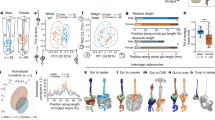Abstract
THE administration of p-dimethylaminoazobenzene to female albino rats on a rice diet has been shown to cause a cessation of the œstral cycles two weeks after administration of the carcinogenic compound1. The weight of the ovaries was reduced, and histo-logically there was an almost complete absence of corpora lutea. In male rats the weight of the testes was reduced and spermatogenesis inhibited. The weight of the adrenal was found to be smaller in the male than that in the female rats, in conformity with the findings of Hatai2. There was no effect on the weight or histological appearance of the adrenal gland in either sex ; 78 per cent of these rats developed hepatic tumours3.
This is a preview of subscription content, access via your institution
Access options
Subscribe to this journal
Receive 51 print issues and online access
$199.00 per year
only $3.90 per issue
Buy this article
- Purchase on Springer Link
- Instant access to full article PDF
Prices may be subject to local taxes which are calculated during checkout
Similar content being viewed by others
References
Hoch-Ligeti, C., Brit. J. Exp. Path., 27, 211 (1946).
Hatai, S., Anat. Rec., 8, 511 (1914).
Hoch-Ligeti, C., Cancer Res., 6, 563 (1946).
Bielschowsky, F., Brit. Med. Bull., 4, 382 (1947).
Author information
Authors and Affiliations
Rights and permissions
About this article
Cite this article
HOCH-LIGETI, C. Effect of Feeding 2-Acetaminofluorene on the Adreno-Gonadal System of Rats. Nature 161, 58–59 (1948). https://doi.org/10.1038/161058a0
Issue Date:
DOI: https://doi.org/10.1038/161058a0
This article is cited by
-
Pharmaca und Nebennierenrinde
Zeitschrift für Die Gesamte Experimentelle Medizin (1954)
-
Über Chemie und Krebs — dargestellt am „Anilinkrebs” (L. Rehn)
Langenbecks Archiv für Klinische Chirurgie (1950)
Comments
By submitting a comment you agree to abide by our Terms and Community Guidelines. If you find something abusive or that does not comply with our terms or guidelines please flag it as inappropriate.



